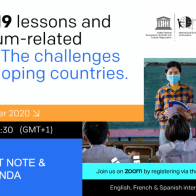The COVID-19 crisis presents unprecedented challenges to education systems across countries and regions. It not only tested the resilience of education systems, but also led to massive school closures, directly affecting about 1.6 billion students from pre-primary to tertiary education. About 900 million learners of the world student population are expected to start the 2020-2021 academic year between August and October. Even though, only 433 million have assurances of returning to full-time face-to-face classes.
Against this background, UNESCO supported and facilitated policy learning by convening ministerial meetings and conducting a series of webinars (on school reopening, teachers, curriculum, assessment) for decision makers and practitioners. In addition, UNESCO also launched the Global Education Coalition in March 2020, an unprecedented multi-partnership involving UN organizations, civil society and private sector, academia and media, to provide appropriate and inclusive distance learning opportunities for all actors’ impacted, educational professionals, learners and families. UNESCO also convened the Global Education Meeting (GEM) to examine education responses to crisis, advocate for protecting education and saving the future of all learners.
The prevailing sanitary conditions and uncertainties constitute a threat to inclusive quality learning for all in terms of digital gaps, partial school reopening, remedial actions to revert learning losses, efficacy of hybrid and remote learning strategies, digital content development, access to learning ecosystems and instructional resources and teacher’s competence in such volatile situation. All these concerns touch up on the what (content), the how (pedagogy) and the when (timing) of education, which are curriculum matters.
The place of curriculum in COVID-19 education response strategies
The COVID-19 crisis reinvigorates the positioning of curriculum as an essential driver for social and educational inclusion as well as to ensure effective learning opportunities for all learners regardless of contexts, circumstances, capacities, affiliations and status. The pandemic reveals at the same time the strength and weakness of education systems in responding to the immediate threats to learning, while imagining the future and in laying foundations for lifelong learning, for learners to lead their lives and perform competently in the world of work in spite of diverse challenges of the present and future.
Some developing countries are making significant progress in adjusting the curriculum and pedagogy to different combinations of face-to-face and distance education using technology (Radio, TV, online platforms, Mobile phones) to enhance teaching and learning. However, switching from traditional classroom-based education to remote education/online learning is not a simple matter
[1]. Going digital requires new sets of skills for curriculum and instructional materials development, teacher training, teaching and assessment. It is not about simply uploading existing print content and instructional materials onto a platform. The pandemic has also made more visible the inadequacies and ineffectiveness of modes of educating, learning and assessing that are exclusively based on face-to-face interactions between teachers and learners, that disregard other approaches, opportunities, spaces and resources available for learning outside the school. The curriculum challenges of educating, learning, teaching and assessing are not new but the COVID-19 pandemic amplified them, in a much more dramatic way than any other crisis.
Governments worldwide are committed to the SDGs
[2]. Education 2030 invigorates the understanding of curriculum as a policy and technical agreement that considers the expectations of a society at several levels-local, national and global-and reflects a system that develops through the process of teaching and learning. Framed within a comprehensive understanding of education as a cultural, economic, social, citizenship and community policy, curriculum is a far-reaching tool whenever it sustains and reforms educational policies in a long-term perspective and helps teachers to develop effective teaching, learning and assessment processes.
In the context of the COVID-19 crisis and future needs of society, countries have to review or re-adjust their policies on curriculum, teaching, learning and assessment. They need to invest in educational technology needs of the curriculum and pedagogical innovations that empower learners, teachers, educators; and use digital technologies as instrument to deliver integrated inclusive quality hybrid education.
The webinar will bring together national decision makers in charge of pedagogy and curriculum issues, practitioners and researchers, from all over the world engaged in actions related to curriculum.
In conjunction with UNESCO HQ, Field Offices and Institutes, the UNESCO International Bureau of Education (IBE-UNESCO) will disseminate the invitation among Ministries of Education and related institutions, universities, networks/communities of curriculum specialists/developers, researchers and practitioners as well as to inter-governmental organizations, NGOs and civil society organizations working in education and curriculum-related issues.
The webinar will be hosted on the Zoom platform, with live streaming on social media (Facebook and YouTube).
Simultaneous interpretation in English, French and Spanish.
